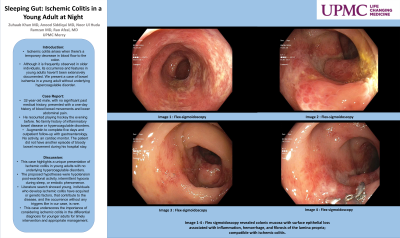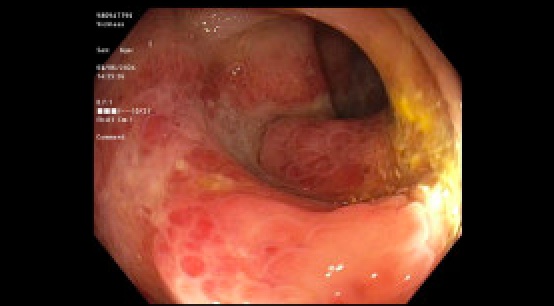Sunday Poster Session
Category: Colon
P0301 - Sleeping Gut: Ischemia Colitis in a Young Adult at Night
Sunday, October 27, 2024
3:30 PM - 7:00 PM ET
Location: Exhibit Hall E

Has Audio
- ZK
Zuhaab U. Khan, MD
University of Pittsburgh Medical Center - Mercy
Pittsburgh, PA
Presenting Author(s)
Zuhaab U. Khan, MD1, Anood Siddiqui, MD1, Noor Ul Huda Ramzan, MD2, Rao Afzal, MD1
1University of Pittsburgh Medical Center - Mercy, Pittsburgh, PA; 2University Medical and Dental College, Pittsburgh, PA
Introduction: Ischemic colitis arises when there's a temporary decrease in blood flow to the colon. The primary symptom observed in intestinal ischemia is abdominal pain accompanied by bloody bowel movements. Although it is frequently observed in older individuals, its occurrence and features in young adults haven't been extensively documented. We present a case of bowel ischemia in a young adult without underlying hypercoagulable disorder.
Case Description/Methods: A 32-year-old male, with no significant past medical history, presented to the emergency department with a one-day history of blood bowel movements and vague lower abdominal pain. He endorsed waking up in the middle of the night with severe abdominal pain followed by multiple episodes of bloody bowel movements with the presence of mucus. The patient also endorsed tenesmus but denied any anorectal pain with defecation. The patient denied any substance use, over-the-counter supplements, travel, or sick contact. His last meal was a cheeseburger. No other family member reported similar symptoms. He recounts playing hockey the evening before. There is no family history of inflammatory bowel disease or hypercoagulable disorders. Flex sigmoidoscopy revealed colonic mucosa with surface epithelial loss associated with inflammation, hemorrhage, and fibrosis of the lamina propria; compatible with ischemic colitis. The patient was started on Amoxicillin-Clavulanate 875mg -125 mg to complete five days and outpatient follow-up with gastroenterology. He was on a cardiac monitor throughout his stay with no activity, an outpatient echocardiogram script was provided at the time of discharge. The patient did not have another episode of bloody bowel movement during his hospital stay.
Discussion: This case highlights a unique presentation of Ischemic colitis in young adults with no underlying hypercoagulable disorders. The likely proposed hypotheses were hypotension post-exertional activity, intermittent hypoxia during sleep, or embolic phenomenon. However, the absence of arrhythmia on the cardiac monitor made the latter less likely. Our literature search showed that young, healthy individuals who develop ischemic colitis have multiple contributing factors, either acquired or genetic, that collectively contribute to the disease, and the occurrence without any triggers like in our case, is rare. This case underscores the importance of considering ischemic colitis in the differential diagnosis for younger adults for timely intervention and appropriate management.

Disclosures:
Zuhaab U. Khan, MD1, Anood Siddiqui, MD1, Noor Ul Huda Ramzan, MD2, Rao Afzal, MD1. P0301 - Sleeping Gut: Ischemia Colitis in a Young Adult at Night, ACG 2024 Annual Scientific Meeting Abstracts. Philadelphia, PA: American College of Gastroenterology.
1University of Pittsburgh Medical Center - Mercy, Pittsburgh, PA; 2University Medical and Dental College, Pittsburgh, PA
Introduction: Ischemic colitis arises when there's a temporary decrease in blood flow to the colon. The primary symptom observed in intestinal ischemia is abdominal pain accompanied by bloody bowel movements. Although it is frequently observed in older individuals, its occurrence and features in young adults haven't been extensively documented. We present a case of bowel ischemia in a young adult without underlying hypercoagulable disorder.
Case Description/Methods: A 32-year-old male, with no significant past medical history, presented to the emergency department with a one-day history of blood bowel movements and vague lower abdominal pain. He endorsed waking up in the middle of the night with severe abdominal pain followed by multiple episodes of bloody bowel movements with the presence of mucus. The patient also endorsed tenesmus but denied any anorectal pain with defecation. The patient denied any substance use, over-the-counter supplements, travel, or sick contact. His last meal was a cheeseburger. No other family member reported similar symptoms. He recounts playing hockey the evening before. There is no family history of inflammatory bowel disease or hypercoagulable disorders. Flex sigmoidoscopy revealed colonic mucosa with surface epithelial loss associated with inflammation, hemorrhage, and fibrosis of the lamina propria; compatible with ischemic colitis. The patient was started on Amoxicillin-Clavulanate 875mg -125 mg to complete five days and outpatient follow-up with gastroenterology. He was on a cardiac monitor throughout his stay with no activity, an outpatient echocardiogram script was provided at the time of discharge. The patient did not have another episode of bloody bowel movement during his hospital stay.
Discussion: This case highlights a unique presentation of Ischemic colitis in young adults with no underlying hypercoagulable disorders. The likely proposed hypotheses were hypotension post-exertional activity, intermittent hypoxia during sleep, or embolic phenomenon. However, the absence of arrhythmia on the cardiac monitor made the latter less likely. Our literature search showed that young, healthy individuals who develop ischemic colitis have multiple contributing factors, either acquired or genetic, that collectively contribute to the disease, and the occurrence without any triggers like in our case, is rare. This case underscores the importance of considering ischemic colitis in the differential diagnosis for younger adults for timely intervention and appropriate management.

Figure: Sigmoid Colon
Disclosures:
Zuhaab Khan indicated no relevant financial relationships.
Anood Siddiqui indicated no relevant financial relationships.
Noor Ul Huda Ramzan indicated no relevant financial relationships.
Rao Afzal indicated no relevant financial relationships.
Zuhaab U. Khan, MD1, Anood Siddiqui, MD1, Noor Ul Huda Ramzan, MD2, Rao Afzal, MD1. P0301 - Sleeping Gut: Ischemia Colitis in a Young Adult at Night, ACG 2024 Annual Scientific Meeting Abstracts. Philadelphia, PA: American College of Gastroenterology.
